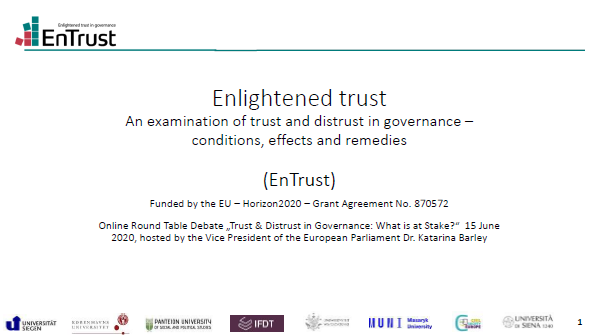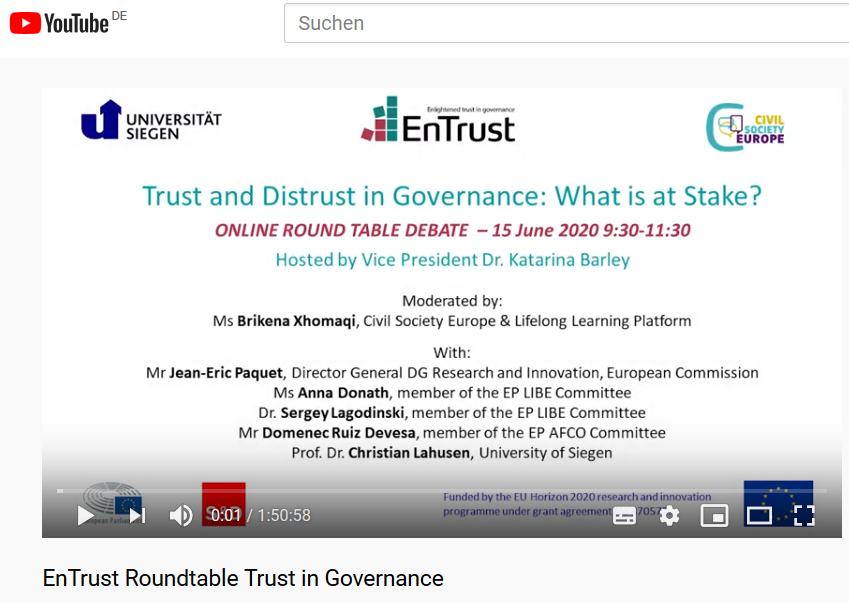Trust and Distrust in Governance: Exploring the Impact of Social and Political Dynamics
International Conference organised by the EU-funded EnTrust project
September 28-29, 2023 – Siena, Italy
Abstract Submission Deadline: April 07, 2023
Find the full Call for Papers here.
Trust in governance is considered a pivotal element for democracy. In light of multiple and interrelated crises of recent years an increase of distrust in governance came to the fore and became a highly debated issue, both within the public and the academic field. At the same time, however, scepticism and distrust themselves are productive elements within the democratic arena, as it is a key role of democratic citizens or social movements to critically scrutinise the actions and decisions of governmental actors. This indicates a complex interrelation between trust and distrust, the factors that are responsible for these interrelations, and the ways how trust and distrust need to be evaluated. All these issues contribute to puzzling questions that still await clarification.
The processes of the construction of dis/trust take place on different levels (such as the local, national, European) and involve the individual citizens, collective actors such as social movements and political parties, political institutions, and public spheres. To unfold the dynamics of dis/trust and their consequences for democracy it is therefore indispensable to consider a variety of factors. These include socio-economic, political, cultural, and psychological aspects on the individual level, but also reciprocal relations and practices between citizens and various governance actors, political contestations and public debates on the collective level. Likewise, the heterogenous historical legacies or cultural contexts of (European) nations and regions need to be taken into account.
The conference takes up the overarching topic of trust and distrust in democratic governments and institutions and aspires to explore it in all its various dimensions and aspects.
The Realm of Bureaucracy and the Creation of Dis/Trust
Possible topics are, among others, the interplay between citizens and public authorities and how these shape the processes of dis/trust building, the role and the shape of the (welfare) state as well as the citizens’ perceptions and opinions about institutional services and institutions, dis/trust building in the context of vulnerable groups (such as disadvantaged families or social welfare users)
Protest, Political Contestation, and the Formation of Trust and Distrust
The role of collective protest and social movements in the creation of dis/trust in governance can be expected to be significant. It needs to be considered in which ways democratic social movements canalise and mobilise forms of distrust within the general public in order to achieve policy changes. Those practices need to be focused that create, challenge, or reproduce trust and distrust relationships.
The Role of the Media in Dis/Trust Contestations
The media plays a key role in the mediation between governance, scientific expertise, and citizens. Various issues can be addressed, such as dis/trust of citizens in journalism and news sources as well as the processes of how dis/trust is constructed in and through the media, the impact of different media technologies on dis/trust relations, dis/trust in times of “fake news” and “alternative facts”.
Dynamics of Individual Trust and Distrust in Governance
In order to understand processes of trust and distrust in governance, individual factors as well as underlying psychological sources and patterns need to be considered. For example, analyses might focus on the developmental changes in individual perceptions of dis/trust and the influences of everyday experiences on trust and distrust, as well as on factors responsible for the formation and change of trust related attitudes, among them political radicalisation and extremism.
Public Deliberations, Political Decision-Making, and Institutional Trust
Individual and collective trust and distrust in governance is strongly conditioned by the functioning of political institutions and the way democratic representation, accountability and participation is organised. It is thus of relevance to analyse the ways in which deliberative forums, public consultations and other participative forms of decision-making influence – next to institutional procedures of policy-making and implementation – dis/trust relationships, on the domestic or European level.
Scope and Aims
During the two-day conference two distinguished experts, Pippa Norris (Harvard University) and Tereza Capelos (University of Birmingham), will hold keynote speeches. Additionally, different panels will be held to present and discuss ongoing research on the various topics and questions identified above.
Please note, that the conference will be organised as an in-person event. After years of online-meetings and conferences because of the Covid pandemic, we very much look forward to interacting with colleagues face-to-face and to reinforce and rebuild links in the community.
We envision the conference to be an inclusive platform, where findings and discussions of the EnTrust project are brought into dialogue with the work of a variety of researchers with different backgrounds. By means of an interactive debate and lively exchange, we hope to gain further insights into different arenas of trust formation as well as into the forms, conditions and implications of trust and distrust in democratic governance. With respect to the composition and aim of the EnTrust project, the conference will strive to combine insights from sociology, psychology, political sciences, and media studies.
Paper Submissions
Researchers from all disciplines indicated above are invited to submit abstracts for talks as of now. We are particularly interested in empirical-driven proposals using a quantitative, qualitative or mixed methods approach.
To submit a paper proposal, we ask for title and abstract (300 words maximum). All abstracts must be written in English. All proposals should be submitted by April 07, 2023. Acceptance mails will be sent by May 06, 2023.
It is an option to participate in a conference poster session as well. The poster session will provide an opportunity for those authors who cannot be considered for a talk. Instead, they will be able to present and discuss the results and conclusions of their papers in small groups. Please indicate in your submission, whether you are interested in this option.
Submissions from young scholars are highly welcomed as well. We can provide a limited number of travel fellowships for (junior) scholars with lack of funding support.
Contact:
Please send your submission to entrust@uni-siegen.de
For more information about the EnTrust research network and their more than 30 researchers: https://entrust-project.eu


